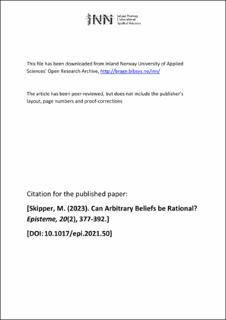| dc.contributor.author | Skipper, Mattias | |
| dc.date.accessioned | 2023-08-04T11:59:50Z | |
| dc.date.available | 2023-08-04T11:59:50Z | |
| dc.date.created | 2022-09-14T14:11:54Z | |
| dc.date.issued | 2023 | |
| dc.identifier.citation | Episteme: A journal of individual and social epistemology. 2023, 20 (2), 377-392. | en_US |
| dc.identifier.issn | 1742-3600 | |
| dc.identifier.uri | https://hdl.handle.net/11250/3082668 | |
| dc.description | © The Author(s), 2022. Published by Cambridge University Press.
Dette er den aksepterte versjonen av en artikkel publisert i Episteme. Du finner den publiserte artikkelen her: https://doi.org/10.1017/epi.2021.50. / This is the postprint version of the article published in Episteme. You can find the published article here: https://doi.org/10.1017/epi.2021.50. | en_US |
| dc.description.abstract | When a belief has been influenced, in part or whole, by factors that, by the believer’s own lights, do not bear on the truth of the believed proposition, we can say that the belief has been, in a sense, arbitrarily formed. Can such beliefs ever be rational? It might seem obvious that they can’t. After all, belief, supposedly, “aims at the truth.” But many epistemologists have come to think that certain kinds of arbitrary beliefs can, indeed, be rational. In this paper, I want to do two things. First, I want to show that the claim that arbitrary beliefs can be rational is inconsistent with the conjunction of two other attractive claims: one saying that rationality requires a certain kind of epistemic immodesty, and one saying that rationality forbids certain kinds of self-ascriptions of epistemic luck. Second, I want to evaluate different ways one might respond to this inconsistent triad. I won’t defend any response in particular, but I’ll draw out some notable costs and benefits of each response, which may help shed light on the question of whether arbitrary beliefs can be rational. | en_US |
| dc.language.iso | eng | en_US |
| dc.rights | Attribution-NonCommercial-NoDerivatives 4.0 Internasjonal | * |
| dc.rights.uri | http://creativecommons.org/licenses/by-nc-nd/4.0/deed.no | * |
| dc.subject | immodesty | en_US |
| dc.subject | arbitrary beliefs | en_US |
| dc.subject | epistemic luck | en_US |
| dc.subject | permissivism | en_US |
| dc.subject | irrelevant influences | en_US |
| dc.title | Can Arbitrary Beliefs Be Rational? | en_US |
| dc.type | Peer reviewed | en_US |
| dc.type | Journal article | en_US |
| dc.description.version | acceptedVersion | en_US |
| dc.subject.nsi | VDP::Samfunnsvitenskap: 200 | en_US |
| dc.source.pagenumber | 377-392 | en_US |
| dc.source.volume | 20 | en_US |
| dc.source.journal | Episteme: A journal of individual and social epistemology | en_US |
| dc.source.issue | 2 | en_US |
| dc.identifier.doi | 10.1017/epi.2021.50 | |
| dc.identifier.cristin | 2051648 | |
| cristin.ispublished | true | |
| cristin.fulltext | postprint | |
| cristin.qualitycode | 1 | |

